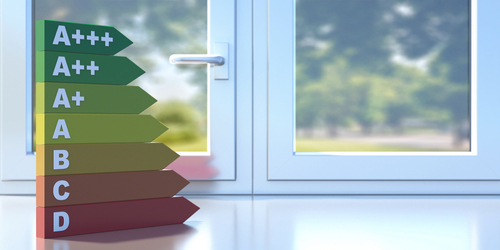Without a doubt this is a hot topic right now with the majority of us feeling the pinch with the ever rising cost’s on our energy bills. We are going to break this down into two sections, home improvements that can help reduce your bills and also low cost DIY alternatives so everyone can benefit.
Home Improvements that can reduce your energy bills
So lets start off with the home improvements you can make to lower those energy bills. This might not apply to all given the cost of some of these so if you want to skip to the DIY section just click here.
Windows and doors
This is an obvious upgrade you can make, around 18 to 15 percent of heat can be lost through your windows. Upgrading your windows to double glazing will not only help keep your house warmer in the winter but also cooler in the summer as the extra layer of glass helps reduce heat radiated in by the sun.
This is one of the more expensive improvements you can make with the average cost to double glaze a semi-detached house with A rated windows being £5,500. Even so uPVC could easily last 20 years + so would see the benefits for a long time to come. Read more here
| Energy rating | Detached | Semi detached | Mid terrace | Bungalow | Mid-floor flat |
|---|---|---|---|---|---|
| A | £120 to £155 | £80 to £110 | £65 to £85 | £55 to £75 | £40 to £55 |
| B | £110 to £140 | £75 to £100 | £60 to £80 | £50 to £70 | £35 to £55 |
| C | £100 to £135 | £75 to £95 | £60 to £75 | £50 to £65 | £35 to £50 |
Solar PV
The next go to home improvement to reduce energy bills is Solar PV. How useful Solar will be to you all depends on your electricity usage and how suitable your property is for it to be efficient.
If you have high electricity usage, are home most of the day or maybe have a large family Solar could be a great option to cut down that energy bill. We recently used the Solar energy calculator and a 4kW system for a 3 bed-semi detached with a West facing roof and being out all day until 4pm the estimated annual benefit was £355 and a life time benefit of £8,572.
We used less than ideal assumptions here, if you have a south facing roof, in the house more of the day or can fit a larger system you absolutely will see much higher potential benefits
Solar battery storage
In additional to solar you can also get battery storage, the jury is still out on if these are a worthwhile investment in the UK as the upfront cost is quite substantial. However by getting battery storage it does reduce the need to buy electricity from the grid and even help you move completely off-grid.
The way energy prices are rising right now, going off-grid doesn’t sound like a bad idea!
Insulation
There are a few different types of insulation you can get for your property. One of the most beneficial types of insulation is loft. A quarter, yes that’s right a quarter of heat is lost through the roof in a poorly insulated home.
Undoubtedly one of the biggest benefits of loft insulation is it could have a lifetime of 40 years! Furthermore its relatively inexpensive meaning it will pay for itself many times over.
In fact below you can see the typical cost to insulate your loft with 270mm of insulation and the estimated annual savings. Within the space of roughly 2 years all property types have paid for themselves leaving a further 38 years of savings!
| Property type | Typical cost | Annual saving |
|---|---|---|
| Detached | £680 | £580 |
| Semi-detached | £530 | £255 |
| Mid-terrace | £500 | £230 |
| Bungalow | £690 | £365 |
Low cost and DIY solutions
DIY options
Draught-proof windows and doors – Firstly you can either bring in a professional to draught-proof your windows, doors and sealing cracks in floors and skirting boards for around £225 or do this yourself. Use products like Weatherstripping tape, brush strips on the bottom of external doors, draught-excluders, flexible sealant and compression threshold strips. You could be saving an extra £45 to £65 per year.
Smart plugs – You’ve probably seen all the recommendations to switch off standby, unplug appliances etc. Whilst that is a good way to reduce your energy bills its not always convenient that’s where smart plugs come in.
From here you can set the plug to turn on/off at predetermined times. According to the Nation Renewable Energy Laboratory smart plugs can save between 1 and 4.58% of energy usage or roughly 500-1000 kilowatts each year.
Insulating your hot water cylinder – This wont apply if you have a combi boiler unfortunately, for those that do have a hot water cylinder, increasing the insulation to a British Standard 80mm thick jacket could save an additional £35 a year. They cost roughly £17 and are easy to fit.
Additionally you can insulation your hot water pipes (Pipe insulation) which will help keep your hot water hotter for longer and install radiator reflector panels. You only need to install these behind radiators on external walls as they reflect heat back into the home.
Upgrade appliances – If you are due to upgrade any of your appliances such as a new freezer, tumble dryer or washing machine look to purchase an energy efficient model.
First and foremost look for appliances that are rated A or better on the EU energy-efficiency rating. It will look something similar to the image and will tell you what that appliance rating is.

Other things YOU can do!
- Turn off the lights and replace bulbs with LED’s – it might sound small but could contribute a further £20-£35 saving a year
- Do you washing at 30 degrees and reduce how often – Just by making this small change its another potential £30 saving a year
- Cut down on the tumble dryer – You might only be able to benefit from this for a few weeks in the UK but dry your clothes outside! or use a clothes rack.
- Shower time – Keeping shower time down to just 4-5 minutes could save the average household a further £70 a year.
- Kitchen activity – Stop over filling the kettle you don’t need a litre of water for one drink, that’s also costing you an extra £15 a year. Look to add an aerator to your taps and you could save another £25
- Washing bowl – yes, a washing bowl. You could also save another £25 a year using a washing up bowl instead of using a running tap.

